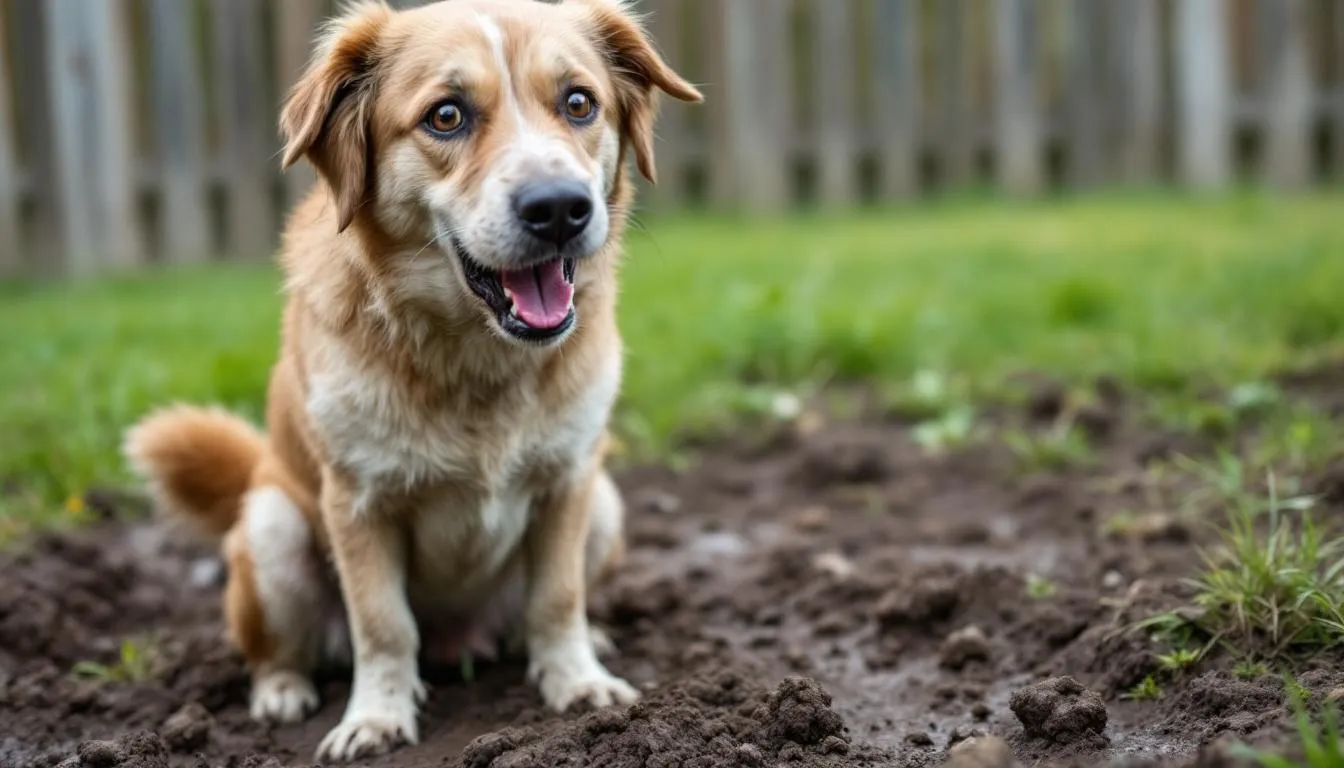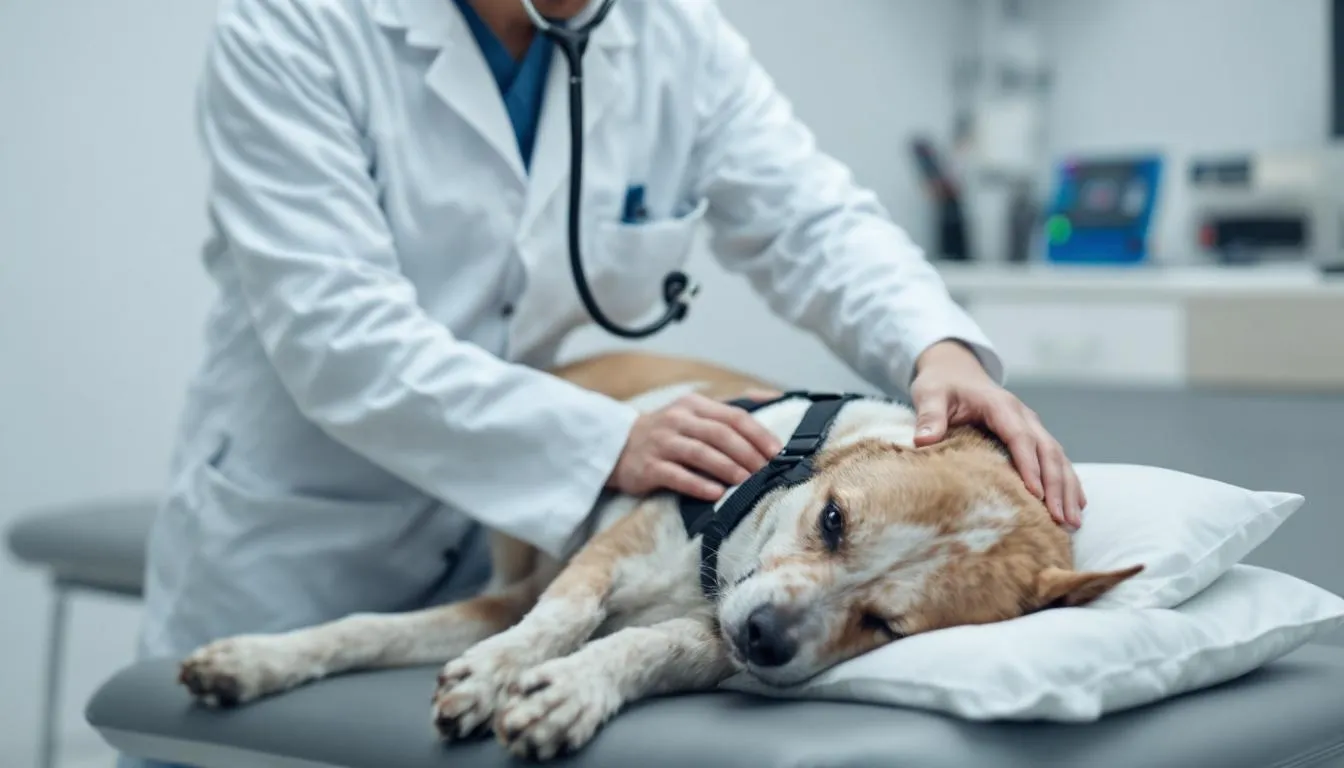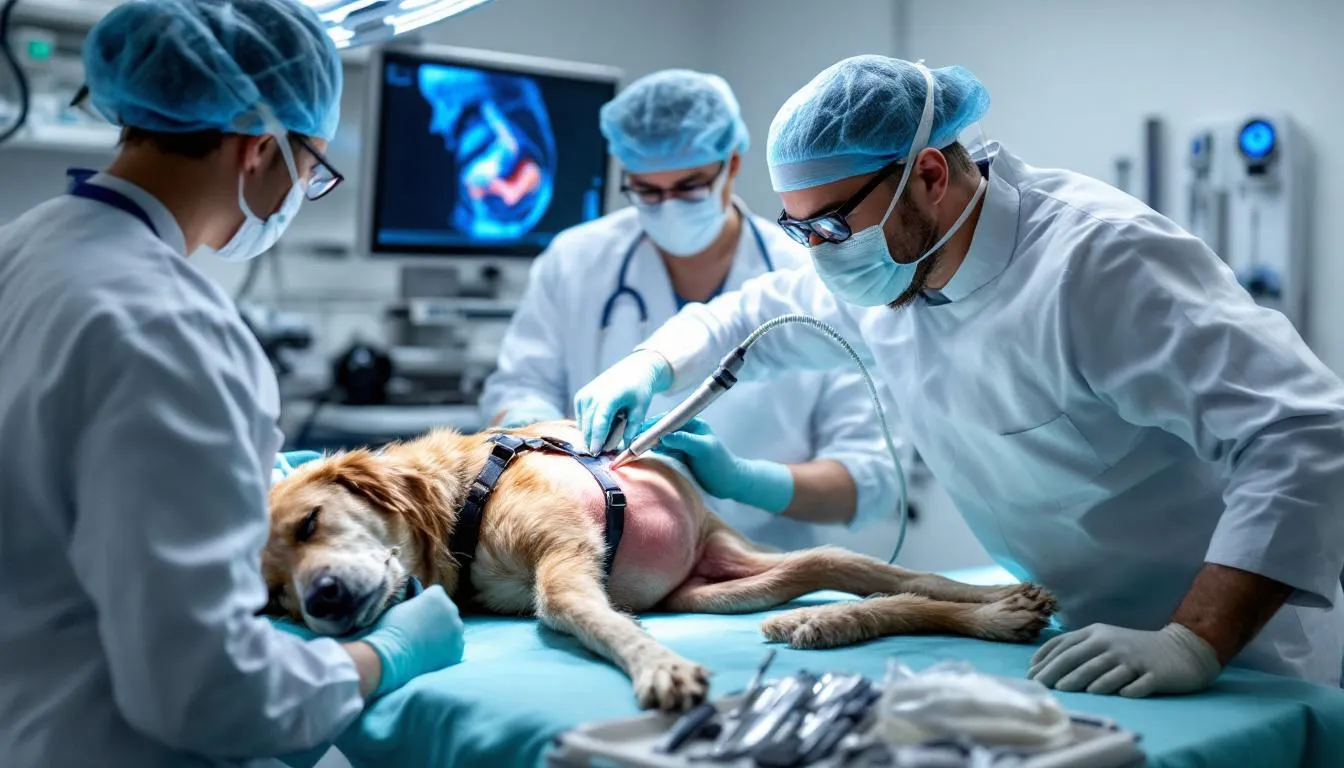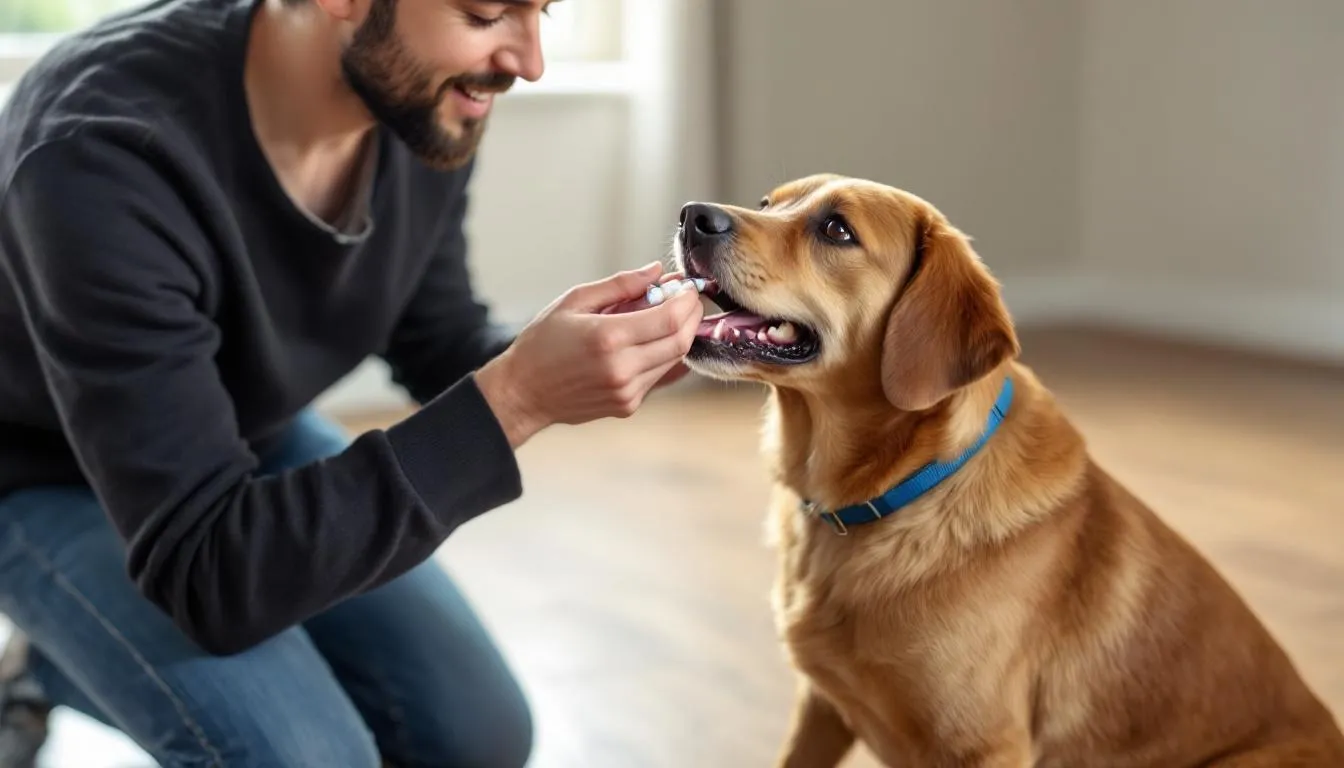

Key Takeaways
Canine colitis is inflammation of the large intestine that causes bloody diarrhea, mucus in stool, and straining during defecation
- Canine colitis is inflammation of the large intestine that causes bloody diarrhea, mucus in stool, and straining during defecation
- Stress is the leading cause of acute colitis in dogs, often triggered by boarding, travel, or environmental changes
- Most cases of acute colitis resolve within 3-5 days with proper veterinary care and dietary management
- Chronic colitis lasting more than 3 weeks requires extensive diagnostics including colonoscopy and biopsies
- Treatment typically involves bland diets, antibiotics like metronidazole, probiotics, and anti-inflammatory medications depending on the underlying cause
Stress is the leading cause of acute colitis in dogs, often triggered by boarding, travel, or environmental changes
Most cases of acute colitis resolve within 3-5 days with proper veterinary care and dietary management
Chronic colitis lasting more than 3 weeks requires extensive diagnostics including colonoscopy and biopsies
Treatment typically involves bland diets, antibiotics like metronidazole, probiotics, and anti-inflammatory medications depending on the underlying cause
When your dog suddenly develops bloody diarrhea with mucus and begins straining during bowel movements, you’re likely witnessing canine colitis—a common but distressing condition that affects the large intestine. This inflammation disrupts normal colonic contractions and water absorption, leading to the characteristic symptoms that cause concern for dog owners worldwide.
Understanding colitis in dogs is crucial because while most cases resolve quickly with appropriate treatment, some forms can become chronic conditions requiring long-term management. The key lies in recognizing the clinical signs early, identifying potential triggers that may trigger colitis, and working with your veterinarian to implement proper treatment strategies.
What is Canine Colitis?
Canine colitis represents inflammation of the large intestine, specifically affecting the cecum, colon, rectum, and anus. The descending colon is one of the key segments examined during diagnostic procedures for colitis, as sampling multiple colonic regions, including the descending colon, helps obtain accurate diagnostic information. This condition disrupts the colon’s primary functions of water absorption, fecal storage, and final nutrient processing with help from beneficial bacteria that maintain digestive health.
The large intestine plays a vital role in your dog’s digestive system. Unlike the small intestine, which handles most nutrient absorption, the colon focuses on extracting water from liquid waste and forming solid stool. When inflammation occurs, this water absorption becomes markedly decreased, leading to the frequent bowel movements and loose consistency typical of large bowel diarrhea.
Large bowel diarrhea differs significantly from small intestinal diarrhea in several key ways. While small intestinal diarrhea typically produces large volumes of watery stool, colitis causes frequent, small volumes of loose stool containing blood and mucus. Dogs with colitis often strain during defecation and may cry out from discomfort, unlike the typically painless nature of small bowel conditions.
The gut microbiome plays a crucial role in colonic health. Beneficial bacteria in the large bowel help ferment remaining fiber, produce essential vitamins, and support immune system function. When colitis develops, this delicate bacterial balance becomes disrupted, potentially prolonging symptoms and complicating recovery.


Types of Colitis in Dogs
Acute colitis develops suddenly and typically resolves within three weeks with appropriate intervention. Most dogs experience complete recovery from acute episodes, especially when stress colitis or dietary indiscretion triggers the inflammation. These cases often respond dramatically to simple treatments like dietary modification and stress reduction.
Acute vs Chronic Classifications
Chronic colitis persists for three weeks or longer, often requiring extensive diagnostic workup to identify underlying causes. Dogs diagnosed with chronic large bowel diarrhea may experience intermittent flare-ups throughout their lives, necessitating ongoing management strategies and regular veterinary monitoring.
Histological Classifications
Veterinary pathologists classify colitis based on the predominant inflammatory cells infiltrating the colonic wall:
Lymphocytic plasmacytic colitis represents the most common form, characterized by infiltration of lymphocytes and plasma cells. This type often responds well to dietary management and anti inflammatory medications, making it one of the more treatable forms of chronic colitis.
Eosinophilic colitis involves eosinophil infiltration and commonly affects younger animals. This form may indicate allergic reactions or parasitic infections, requiring targeted treatment approaches based on the underlying cause.
Granulomatous colitis , also known as histiocytic ulcerative colitis, primarily affects young Boxers and French Bulldogs. This severe condition involves bacterial invasion of the colonic wall and requires aggressive antibiotic therapy for successful management. Granulomatous colitis can result in a partially obstructed segment of the colon due to thickening and inflammation, which is often observed as a gross lesion during examination.
Neutrophilic colitis typically indicates acute bacterial infection and may resolve quickly with appropriate antimicrobial drugs when the causative organism is identified and treated effectively.
Clinical Signs and Symptoms
Primary Symptoms
The most common clinical sign of canine colitis is frequent passage of small volumes of loose stool containing bright red blood and mucus. Unlike normal bowel movements, these stools often have a jelly-like consistency due to increased mucus production from the inflamed mucosal surface.
Dogs with colitis demonstrate obvious straining (tenesmus) during defecation, often appearing to have incomplete evacuation. This straining may continue even after passing stool, as residual fecal material and inflammation create a persistent urge to defecate.
Pain during bowel movement is evident in many cases, with dogs crying out, looking back at their hindquarters, or showing reluctance to assume defecation postures. Some dogs develop behavioral changes like scooting their hindquarters on the ground or excessive licking of the anal area.
Secondary Signs and Behavioral Changes
While diarrhea dominates the clinical picture, some dogs develop secondary symptoms including occasional vomiting, though this occurs in fewer than one-third of cases. Weight loss is uncommon in acute colitis but may occur in severe cases of chronic disease, particularly granulomatous colitis in susceptible dog breeds.
House-trained dogs may begin having indoor accidents due to the sudden onset of urgency and inability to control bowel movements. This behavioral change often distresses owners and may be the first sign that prompts veterinary consultation.
Acute vs Chronic Colitis Symptoms
Acute colitis typically presents with sudden onset liquid diarrhea containing bright red blood, requiring multiple urgent bathroom trips throughout the day. Most dogs maintain normal appetite and energy levels despite the digestive upset.
Chronic colitis manifests as persistent soft stools with blood or mucus, though affected dogs often appear otherwise healthy between episodes. Imaging studies occasionally demonstrate intraluminal narrowing, suggesting ongoing inflammation and potential scarring.
In granulomatous colitis affecting Boxers and French Bulldogs, chronic bloody diarrhea accompanies significant weight loss and may progress to severe systemic illness without proper treatment. This breed-specific condition requires immediate veterinary attention and specialized antibiotic therapy.


Causes of Canine Colitis
Stress colitis represents the leading cause of acute episodes in dogs. Common stress triggers include boarding at kennels, traveling to new locations, moving households, veterinary visits, severe weather changes, and disruptions to normal daily routines. The stress response suppresses immune system function and alters normal colonic motility, predisposing dogs to develop colitis.
Stress-Related Factors
Urban and active dogs appear particularly susceptible to stress-induced episodes, especially those subjected to frequent environmental changes or irregular schedules. Even positive stressors like exciting trips or new family members can trigger colitis in sensitive individuals.
Dietary Causes
Sudden dietary changes, even switching between high-quality foods, can trigger colitis by disrupting the established gut microbiome. Dogs eating garbage, spoiled food, or inappropriate human foods frequently develop acute episodes that resolve once the offending material is eliminated.
Food allergies and intolerances represent significant causes of chronic colitis. Common allergens include beef, dairy, wheat, and chicken proteins, though any dietary component can potentially trigger immune-mediated inflammation in susceptible dogs.
Infectious Agents
Intestinal parasites like Giardia, Cryptosporidium, and whipworms commonly cause colitis, particularly in puppies and shelter animals. These organisms directly damage the colonic mucosa and trigger inflammatory responses that persist even after parasite elimination.
Bacterial infection from Salmonella, Clostridium species, Campylobacter, or specific E. coli strains can cause acute colitis outbreaks, especially in kennel settings or after exposure to contaminated water sources. Some bacteria produce toxins that directly irritate the large bowel lining.
Fungal disease, while rare, can cause chronic colitis in certain geographic regions where organisms like Histoplasma are endemic. These infections typically require specialized diagnostic testing and prolonged antifungal treatment.
Inflammatory and Immune-Mediated Causes
Primary inflammatory bowel disease represents an aberrant immune response to normal luminal antigens in genetically predisposed dogs. This condition typically requires immunosuppressive drugs for long-term management and may involve both the small intestine and large bowel.
An infiltrative disease process, including certain cancers, can present as chronic colitis unresponsive to standard treatments. While uncommon, neoplastic cells may be identified during routine abdominal radiographs or abdominal ultrasound examinations in older dogs.
Breed-Specific Predispositions
Certain dog breeds show clear genetic predisposition to specific colitis forms. Boxers and French Bulldogs under four years of age are highly susceptible to granulomatous colitis caused by bacterial invasion of adherent and invasive E. coli strains.
Young dogs in general appear more prone to eosinophilic colitis, while purebred animals may have higher incidence rates of chronic inflammatory conditions compared to mixed breeds. However, most dogs of any breed, age, or sex can develop colitis given appropriate triggers.


Diagnosis of Canine Colitis
Veterinary diagnosis begins with thorough medical history focusing on symptom duration, stool characteristics, recent dietary changes, stress events, and travel history. A thorough rectal examination often reveals inflammation, pain, or abnormal tissue consistency suggesting colonic involvement.
Initial Evaluation
Physical examination includes abdominal palpation to detect pain, masses, or intestinal thickening. The veterinarian assesses hydration status, as dogs with severe diarrhea may require fluid therapy to prevent dehydration and electrolyte imbalances.
Basic Diagnostic Tests
Fecal examination remains fundamental for identifying parasites through microscopic evaluation, flotation techniques, and specialized staining. Bacterial culture may be performed when infectious causes are suspected, particularly in multi-dog households or shelter environments.
Blood tests including complete blood count and biochemistry panels help rule out systemic diseases that might present as colitis. These routine tests also establish baseline values for monitoring if long-term medications become necessary.
Advanced Diagnostic Methods
When colitis is diagnosed as chronic or fails to respond to initial treatment, more extensive testing becomes necessary. A thorough rectal examination under sedation may reveal abnormalities not apparent during conscious examination.
Routine abdominal radiographs can identify foreign bodies, intestinal obstructions, or masses that might contribute to symptoms. Abdominal ultrasound provides detailed visualization of colonic wall thickness and may reveal enlarged lymph nodes suggesting inflammatory or neoplastic conditions.
A diet trial using novel protein or hydrolyzed diets for 8-12 weeks helps identify food allergies or intolerances as underlying causes. This process requires strict dietary compliance and patience, as improvement may take several weeks to become apparent.
Colonoscopy with colon biopsies represents the gold standard for definitive diagnosis of chronic colitis. This procedure requires anesthesia and proper bowel preparation but allows direct visualization of the mucosal surface and collection of tissue samples for histopathological examination.
Specialized testing may include fluorescent in situ hybridization (FISH) for detecting invasive E. coli in suspected granulomatous colitis cases, or Clostridioides difficile toxin testing in dogs with severe hemorrhagic diarrhea.


Treatment Options for Canine Colitis
Most veterinarians recommend a 6-12 hour fasting period to allow the inflamed colon to rest, followed by gradual introduction of easily digestible foods. This approach helps reduce the volume of material passing through the irritated large bowel while maintaining adequate nutrition.
Initial Management Strategies
Hydration support becomes crucial in dogs showing signs of dehydration from fluid loss. Mild cases may respond to encouraging increased water intake, while more severe cases require subcutaneous or intravenous fluid administration to restore normal hydration status.
Dietary Management
A bland diet represents the cornerstone of colitis treatment, typically consisting of boiled chicken and white rice or lean hamburger and rice in a 1:2 ratio. These easily digestible ingredients minimize colonic irritation while providing necessary calories and protein for recovery.
Dietary fiber supplementation can benefit many dogs with colitis. Plain canned pumpkin (not pie filling) provides soluble fiber that helps normalize stool consistency, while prescription high-fiber diets may benefit dogs with chronic conditions.
For dogs with suspected food allergies, novel protein diets featuring duck, venison, rabbit, or hydrolyzed protein formulations help identify and eliminate allergenic ingredients. These elimination diets require 8-12 weeks of strict compliance to properly evaluate effectiveness.
Prebiotics and probiotics help restore the disrupted gut microbiome common in colitis cases. Veterinary-approved products containing specific bacterial strains show better efficacy than human supplements, as they’re formulated specifically for canine digestive systems.
Medical Treatments
Antibiotic therapy plays a central role in treating many colitis cases. Metronidazole remains the most commonly prescribed medication due to its anti-inflammatory effects in addition to antimicrobial properties. This medication often produces rapid improvement in symptoms within 24-48 hours.
Anti inflammatories are often prescribed to reduce gut inflammation and pain in chronic colitis cases, and may be used alongside other therapies such as probiotics and antibiotics.
Anti inflammatory drugs, particularly prednisolone, are essential for managing immune-mediated or chronic inflammatory conditions. These medications suppress the inflammatory response but require careful monitoring for side effects during long-term use.
For refractory cases that don’t respond to standard treatments, immunosuppressive drugs like azathioprine (in dogs) or chlorambucil may be necessary. These powerful medications require regular blood monitoring but can achieve remission in difficult cases.
Worming treatment should be administered if intestinal parasites are identified, using appropriate medications based on the specific parasite involved. Even negative fecal examinations may warrant empirical deworming in high-risk situations.
Emerging and Specialized Therapies
Fecal microbiota transplantation represents a promising new approach for restoring healthy gut bacteria in dogs with persistent dysbiosis. This procedure involves transplanting fecal material from healthy donor dogs to re-establish normal microbial populations.
For granulomatous colitis in Boxers and French Bulldogs, targeted antimicrobial therapy with enrofloxacin often produces dramatic improvement. This specific antibiotic effectively eliminates the invasive E. coli strains responsible for this breed-specific condition.
Advanced probiotic therapies and microbiome modulation techniques continue to evolve, offering new hope for dogs with chronic conditions that previously required lifelong immunosuppression.
Probiotics and Colitis
Probiotics have become an increasingly important tool in the management of colitis in dogs, especially for those suffering from chronic colitis, inflammatory bowel disease, or recurring episodes of acute colitis. These supplements contain beneficial bacteria that help restore and maintain a healthy balance within the gut microbiome—a critical factor in supporting the large bowel’s normal function.
When the large bowel is inflamed, as in colitis, the population of beneficial bacteria can become disrupted, making it harder for your dog’s digestive system to recover. By introducing targeted strains of probiotics, you can help replenish these good bacteria, which in turn supports the mucosal surface, enhances immune system function, and promotes normal colonic contractions. This is particularly valuable for dogs experiencing large bowel diarrhea, as a balanced microbiome can help firm up stools and reduce the frequency of bowel movements.
Probiotics are also beneficial for dogs with irritable bowel syndrome and other gastrointestinal disorders, as they help stabilize the gut environment and may reduce the severity and duration of symptoms. While not a cure-all, incorporating probiotics as part of a comprehensive treatment plan can make a significant difference in managing both acute and chronic forms of colitis.
It’s important to choose veterinary-formulated probiotics, as these are specifically designed for canine digestive systems and contain strains proven to be effective in dogs. Always consult your veterinarian before starting any probiotic supplement to ensure it’s appropriate for your dog’s specific condition and to determine the correct dosage. With proper use, probiotics can be a safe and effective way to support your dog’s large bowel health and overall well-being.
Prognosis and Recovery
Acute Colitis Outcomes
Most dogs with acute stress colitis show excellent prognosis, with complete resolution of symptoms within 3-5 days when appropriate treatment is implemented. The majority of these cases never recur, especially when owners identify and avoid the inciting stressors.
Early intervention significantly improves outcomes, as prompt treatment prevents the development of secondary complications and reduces the duration of discomfort for affected dogs.
Chronic Colitis Management
Dogs diagnosed with chronic forms of colitis typically achieve good short-term symptom control, though complete cure remains rare. Long-term management focuses on maintaining remission through dietary compliance, medication schedules, and lifestyle modifications.
Lymphocytic-plasmacytic colitis generally responds well to combination therapy involving dietary management and anti inflammatory medications. Many dogs achieve sustained remission with appropriate treatment protocols.
Granulomatous colitis in susceptible breeds carries a more guarded prognosis, particularly in Boxers where the condition can be life-threatening. However, early diagnosis and aggressive treatment with appropriate antimicrobials can lead to complete remission in some cases.
Long-term Management Considerations
Successful long-term management requires strict adherence to prescribed diets, especially in dogs with identified food allergies. Even small amounts of offending ingredients can trigger severe relapses in sensitive individuals.
Regular medication administration remains crucial for dogs requiring ongoing anti inflammatory or immunosuppressive therapy. Owners must understand the importance of consistent dosing and regular veterinary monitoring to prevent colitis treatment complications.
Monitoring protocols should include regular veterinary check-ups, periodic stool examinations, and blood work monitoring for dogs on long-term medications. These measures help detect problems early and adjust treatment options as needed.
Prevention Strategies
Stress Management
Preventing stress colitis involves recognizing and minimizing potential triggers in your dog’s environment. Gradual introduction to new situations, maintaining consistent daily routines, and providing familiar items during travel can significantly reduce stress-induced episodes.
For dogs prone to stress colitis, consider using anxiety-reducing techniques like pheromone diffusers, calming supplements, or behavior modification training to help them cope with unavoidable stressors.
Dietary Control
Maintaining stable dietary routines helps prevent colitis episodes triggered by food changes. When dietary transitions become necessary, implement gradual changes over 7-10 days, mixing increasing proportions of new food with decreasing amounts of the previous diet.
Training your dog to “leave it” on command can prevent garbage ingestion and dietary indiscretions that commonly trigger acute colitis episodes. Securing household toxins and maintaining awareness of your dog’s environment during walks also reduce exposure risks.
Routine Healthcare
Regular veterinary care including routine parasite prevention significantly reduces the risk of developing colitis from intestinal parasites. Annual fecal examinations help detect infections before they cause clinical symptoms.
Early detection of underlying health issues through routine examinations and blood work can identify conditions that might predispose dogs to develop colitis, allowing for preventive interventions.
When to Seek Veterinary Care
Emergency Situations
Seek immediate veterinary attention if your dog develops blood in stool accompanied by severe straining, signs of dehydration (decreased skin elasticity, dry gums, lethargy), or systemic illness. These signs may indicate serious complications requiring urgent intervention.
Dogs showing signs of severe pain, continuous straining without producing stool, or collapse should receive emergency care, as these symptoms might indicate complications like intestinal obstruction or severe inflammatory conditions.
Non-Emergency Situations
For dogs with mild symptoms, monitor carefully for 24-48 hours while implementing basic supportive care. However, schedule veterinary consultation if diarrhea persists beyond this timeframe or if new symptoms develop.
Dogs with recurrent colitis episodes require pattern identification to determine underlying causes and develop appropriate treatment. Keep detailed records of symptoms, potential triggers, and response to treatments to help your veterinarian develop effective management strategies.
FAQ
Can I give my dog human anti-diarrheal medications for colitis?
No, human medications like Imodium can be dangerous for dogs and may worsen colitis by slowing the elimination of harmful bacteria or toxins. Always consult your veterinarian before giving any medications. Some human medications are toxic to dogs, and even “safe” ones can interfere with the natural healing process or mask serious symptoms that require professional treatment.
How long should I wait before taking my dog to the vet for colitis symptoms?
If symptoms are mild and your dog is eating and active, you can try a bland diet for 24 hours. However, seek immediate veterinary care if there’s blood in stool, severe straining, or if symptoms worsen or don’t improve within 24-48 hours. Dogs with chronic diarrhea or recurrent episodes should be evaluated promptly to identify underlying causes and prevent complications.
Is colitis contagious between dogs?
Most forms of colitis are not directly contagious, but some infectious causes like Salmonella or Giardia can spread between animals through fecal-oral transmission. Stress colitis and inflammatory bowel disease are not contagious. However, it’s wise to practice good hygiene and separate affected dogs from healthy ones until infectious causes are ruled out, especially in multi-pet households.
Can diet alone cure chronic colitis in dogs?
While dietary management is crucial and some dogs with food allergies may achieve remission with proper diet, many chronic colitis cases require ongoing medical treatment including antibiotics or anti inflammatory medications alongside dietary therapy. The combination approach typically provides better long-term outcomes than diet modification alone, particularly for immune-mediated or inflammatory conditions.
What’s the difference between colitis and regular diarrhea in dogs?
Colitis specifically affects the large intestine and produces frequent, small volumes of stool with blood and mucus, along with straining. Regular small intestine diarrhea typically produces larger volumes of watery stool without blood, and dogs usually don’t strain as much. Colitis also tends to cause more urgency and discomfort during defecation, while small bowel diarrhea may be relatively painless but more voluminous and watery.
Can colitis in cats be confused with other diseases?
Yes, colitis in cats can be confused with other diseases that cause similar gastrointestinal symptoms. Feline infectious peritonitis (FIP) is an important infectious cause to rule out, as it can mimic colitis or other inflammatory conditions in cats. Proper diagnostic testing is essential to distinguish between these conditions.
FAQ
Can I give my dog human anti-diarrheal medications for colitis?
No, human medications like Imodium can be dangerous for dogs and may worsen colitis by slowing the elimination of harmful bacteria or toxins. Always consult your veterinarian before giving any medications. Some human medications are toxic to dogs, and even “safe” ones can interfere with the natural healing process or mask serious symptoms that require professional treatment.
How long should I wait before taking my dog to the vet for colitis symptoms?
If symptoms are mild and your dog is eating and active, you can try a bland diet for 24 hours. However, seek immediate veterinary care if there’s blood in stool, severe straining, or if symptoms worsen or don’t improve within 24-48 hours. Dogs with chronic diarrhea or recurrent episodes should be evaluated promptly to identify underlying causes and prevent complications.
Is colitis contagious between dogs?
Most forms of colitis are not directly contagious, but some infectious causes like Salmonella or Giardia can spread between animals through fecal-oral transmission. Stress colitis and inflammatory bowel disease are not contagious. However, it’s wise to practice good hygiene and separate affected dogs from healthy ones until infectious causes are ruled out, especially in multi-pet households.
Can diet alone cure chronic colitis in dogs?
While dietary management is crucial and some dogs with food allergies may achieve remission with proper diet, many chronic colitis cases require ongoing medical treatment including antibiotics or anti inflammatory medications alongside dietary therapy. The combination approach typically provides better long-term outcomes than diet modification alone, particularly for immune-mediated or inflammatory conditions.
What’s the difference between colitis and regular diarrhea in dogs?
Colitis specifically affects the large intestine and produces frequent, small volumes of stool with blood and mucus, along with straining. Regular small intestine diarrhea typically produces larger volumes of watery stool without blood, and dogs usually don’t strain as much. Colitis also tends to cause more urgency and discomfort during defecation, while small bowel diarrhea may be relatively painless but more voluminous and watery.
Can colitis in cats be confused with other diseases?
Yes, colitis in cats can be confused with other diseases that cause similar gastrointestinal symptoms. Feline infectious peritonitis (FIP) is an important infectious cause to rule out, as it can mimic colitis or other inflammatory conditions in cats. Proper diagnostic testing is essential to distinguish between these conditions.






